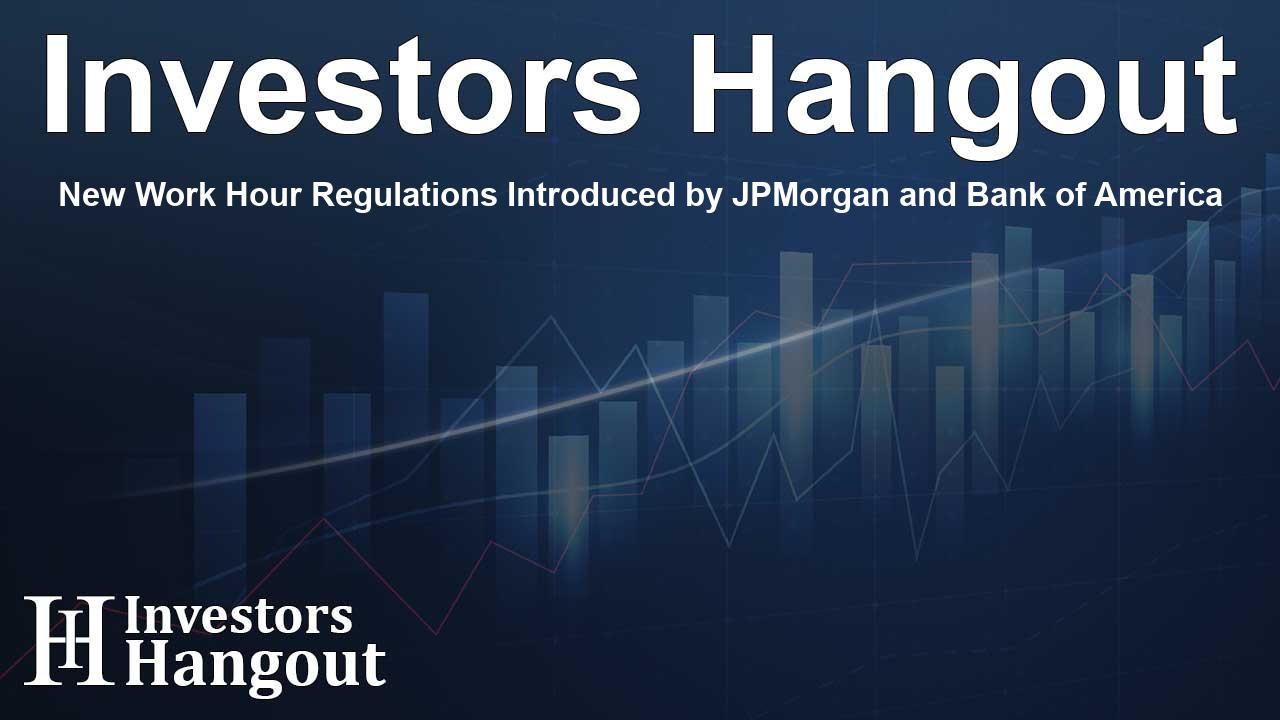New Work Hour Regulations Introduced by JPMorgan and Bank of America

New Measures for Junior Bankers at Major Banks
JPMorgan Chase & Co and Bank of America Corp are taking significant steps to protect junior bankers by introducing measures that will monitor and limit their work hours.
Understanding the Changes
In light of concerns about a toxic work culture in investment banking, both banks are reworking their policies. A recent investigation revealed that junior bankers at Bank of America often felt pressured to manipulate their work hours to comply with existing limits.
As part of these reforms, JPMorgan Chase will implement an 80-hour weekly cap on the hours junior investment bankers can work. This marks a significant policy shift for the bank, although exceptions may occur during urgent situations, such as ongoing deals.
The Role of New Timekeeping Tools
In response, Bank of America is launching a new timekeeping system that will require junior bankers to log their hours daily, along with details of the tasks they complete for different supervisors.
This initiative follows a tragic event where a young associate at Bank of America lost his life after enduring long, grueling workweeks. His experience sparked widespread conversations about employee safety and the responsibility banks have within the industry.
Learning from Tragedy
In the wake of this heart-wrenching incident, JPMorgan's CEO, Jamie Dimon, emphasized the importance of learning from past mistakes. The revised guidelines aimed at improving work conditions have been shared with employees. To enhance enforcement, Bank of America plans to address prior shortcomings in adhering to work hour limits.
Industry Context
The culture of overwork isn’t new in corporate settings. High-profile figures like Elon Musk have repeatedly mentioned the expectation that long hours are essential for achieving success. Musk famously said, "Nobody ever changed the world on 40 hours a week," which underlines the cultural normalization of demanding work hours.
Similarly, Jeff Bezos, founder of Amazon.com Inc., has dismissed the idea of “work-life balance” as detrimental. He promotes “work-life harmony,” suggesting that in high-pressure environments, maintaining a strict separation between work and personal life isn't practical.
In contrast, leaders like Warren Buffett have argued that individuals working a standard 40-hour week should be able to enjoy a decent life, which raises concerns about financial inequality and the necessity for a more just employment structure.
Voices of Experience
Historical figures in the industry, such as the late Steve Jobs, co-founder of Apple Inc., were renowned for demanding high levels of commitment from their teams. Bill Gates, co-founder of Microsoft Corp, acknowledged that while Jobs inspired many, his intense expectations were not without flaws.
Interestingly, Gates remarked, “He would overwork people, so it wasn’t a perfect thing, but Steve was amazing, I learned a lot from him,” highlighting the nuanced nature of leadership in high-pressure industries.
Next Steps for the Industry
The impact of these new regulations could set a strong precedent for the financial sector and beyond. As banks like JPMorgan and Bank of America actively work to reshape the conversation around workload management, there’s a possibility that the overall culture in corporate environments will start to shift.
Frequently Asked Questions
What new regulations are being introduced by JPMorgan and Bank of America?
The banks are enforcing an 80-hour weekly work limit for junior bankers and launching a new system to track their work hours.
Why are these changes significant?
These changes aim to tackle the critical issue of overwork in the banking industry, particularly after a tragic incident related to excessive hours.
How will the new timekeeping tool work?
Junior bankers will need to log their hours daily and provide details about their tasks, which will enhance accountability and transparency.
What events triggered this reform?
The reforms were initiated after the sad passing of a junior banker who had been subjected to extremely long work hours.
How might this impact the banking industry?
These reforms could establish new standards for managing workloads and ensuring employee well-being, potentially inspiring other sectors to rethink their practices.
About The Author
Contact Lucas Young privately here. Or send an email with ATTN: Lucas Young as the subject to contact@investorshangout.com.
About Investors Hangout
Investors Hangout is a leading online stock forum for financial discussion and learning, offering a wide range of free tools and resources. It draws in traders of all levels, who exchange market knowledge, investigate trading tactics, and keep an eye on industry developments in real time. Featuring financial articles, stock message boards, quotes, charts, company profiles, and live news updates. Through cooperative learning and a wealth of informational resources, it helps users from novices creating their first portfolios to experts honing their techniques. Join Investors Hangout today: https://investorshangout.com/
The content of this article is based on factual, publicly available information and does not represent legal, financial, or investment advice. Investors Hangout does not offer financial advice, and the author is not a licensed financial advisor. Consult a qualified advisor before making any financial or investment decisions based on this article. This article should not be considered advice to purchase, sell, or hold any securities or other investments. If any of the material provided here is inaccurate, please contact us for corrections.
